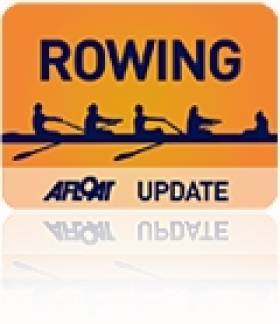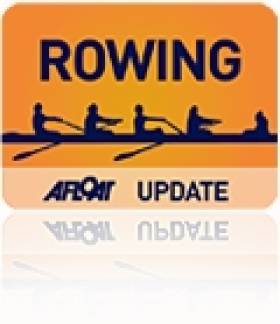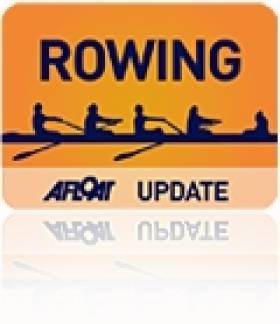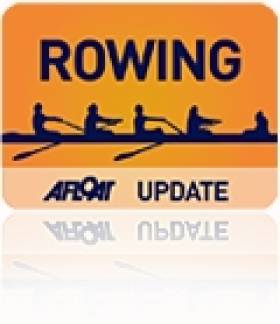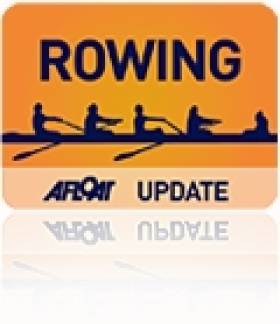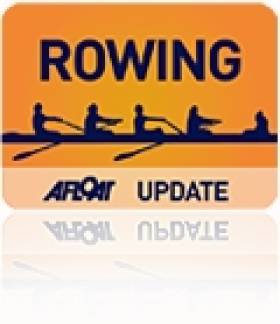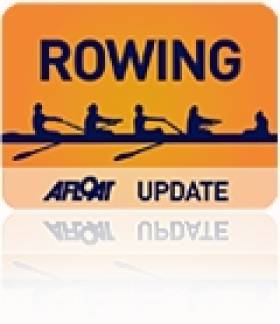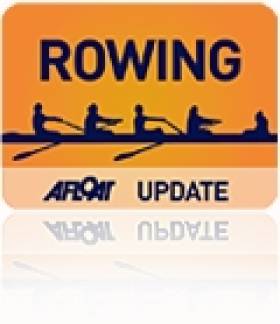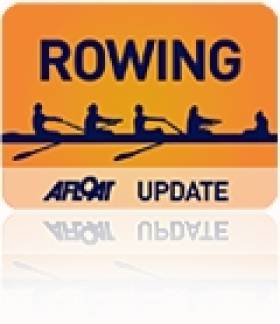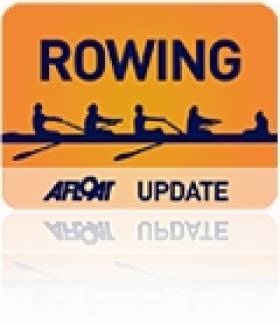Displaying items by tag: Keohane
Shandon/Presentation Eight Fastest at Cork Head
#ROWING: A composite men’s senior eight of Shandon Rowing Club and Presentation Brothers College, Cork were the fastest crew at the Cork Head of the River today. They outpaced two other senior eights: a Shandon/Cahir composite and Cork Boat Club. The UCC intermediate eight were the second fastest overall, clocking 12 minutes 36.6 seconds - just under seven seconds off the winning time. John Keohane of Lee Valley was the fastest single sculler on the day, and Amy Bulman recorded the fastest time for a woman.
Cork Head of the River (Selected Results)
Men
Head One:
Eight – Senior: 1 Shandon/Presentation 12 minutes 29.7 seconds, 2 Cork BC 12:44.8, 3 Shandon/Cahir 13:29.7. Intermediate: UCC 12:36.6. Junior 18: Cork 12:55.7.
Head Two:
Sculling, Single – Senior: Lee Valley (J Keohane) 15:10.7. Inter: Lee (D O’Sullivan) 15:44.7. Jun 18: 1 Fermoy (G Morrison) 15:53.8, 2 Athlunkard (E Gallagher) 16:09, 3 Lee (H Deasy) 16:09.5. Jun 16: Lee (L Guerin) 16:35.3.
Head Three:
Four – Senior: UCC 13:58.8. Inter, coxed: Cork 14:19.4. Jun 18, coxed: Muckross 17:21.9. Jun 16, coxed: Fermoy 16.44.2.
Head Four:
Sculling, Quadruple – Inter: Shandon 14:08.7. Club Two, coxed: Clonmel 15:46.5. Jun 18: Cork 14:16. Jun 16, coxed: Cork 14:47.5.
Head Five:
Pair – Jun 18A: Cork 16:36.0.
Head Six:
Sculling, Double – Inter: Presentation, Cork 15:41.6. Club Two: Shandon 16:52.7. Novice: St Brendan’s 19:15.3. Jun 18A: Shandon 15:41.4. Jun 16: Lee 16:43.0.
Rolling Head
Eight – Intermediate: Muckross 14:22.3. Masters: Fermoy 14:16.6.
Pair – Jun 18A: Pres, Cork 17:39.9.
Sculling, Quadruple – Inter: UCC 15:59.5. Club Two, coxed: Fermoy 18:27.8. Novice, coxed: St Brendan’s 16:19.0. Jun 18A: Pres, Cork 14:32.0. Jun 16, coxed: Pres, Cork 14:36.2. Masters: Shandon 15:31.3.
Double – Jun 18: Presentation, Cork 16:05.4. Jun 16: Skibbereen 16:21.6.
Single – Senior: Clonmel (A Chadfield) 16:57.2. Jun 18: Skibbereen (K Mannix) 17:18.5. Jun 16: Skibbereen (D O’Sullivan) 18:47.5. Masters: Cahir (D Heffernan) 16:49.3.
Women
Head One:
Eight – Intermediate: UCC 15:24.3.
Sculling, Quadruple – Club Two, coxed: Lee 15:08.5. Novice, coxed: Fermoy 16:55.6. Junior 16, coxed: Cork 15:34.9.
Head Two:
Pair – Senior: Cork 16:38.2. Junior 18A: Lee 16:54.8.
Head Three:
Sculling, Double – Senior: UCC 15:45.0. Jun 18A: Cork 16:45.6. Jun 16: Lee 16:33.0.
Head Five:
Sculling, Single – Senior: 1 UCC (A Bulman) 17:57.3, 2 Cork (M O’Neill) 18:10.8. Inter: UCC 19:11.1. Novice: Lee 21:03.1. Junior 18A: Muckross 19.04.0. Jun 16: Lee Valley 19:17.8.
Rolling Head
Eight – Jun 16: Shandon 16:29.9.
Four – Masters, coxed: Clonmel 18:59.4.
Pair – Senior: UCC 17:33.3.
Sculling, Quadruple – Club Two, coxed: Fermoy 18:27.8. Jun 16, coxed: Shandon 15:57.8.
Double – Jun 18A: Clonmel 17:57.4. Jun 16: Fermoy 17:27.1.
Single – Senior: Fermoy (S Bouanane) 17:36.4. Inter: Fermoy (S Bouanane) 19:25.9. Jun 18A: Fermoy (S Cotter) 18:40.5. Jun 16: Shandon (C Minehane) 17:51.5.
Moran and Dukarska Miss out at Aiguebelette Rowing
#ROWING: Ireland’s Monika Dukarska and Eimear Moran had to settle for missing out on a semi-final place at the World Cup Regatta in Aiguebelette in France. The Ireland double scull was in with a chance of taking the top-three place they needed until the final third of the race. John Keohane was off the pace in his repechage of the men’s single scull.The Corkman finished fourth when a top-two place would have taken him through to the A/B semi-finals.
World Cup Regatta, Aiguebelette, France, Day One (Selected Results, Irish interest)
Men
Single Sculls – Heat One (Time Trial; First Directly to A/B Semi-Finals; rest to Repechage); 1 Cuba (A Fournier Rodriguez) 6:48.06; 2 Canada 6:55.45, 3 Finland 6:59.39, 4 United States 7:06.59, 5 Ireland (J Keohane) 7:12.69, 6 Hungary 7:17.37. Repechage One (Two to A/B Semi-Finals): 4 Keohane 7:39.38.
Lightweight Single Sculls – Heats (Time Trials; First Two Directly Through to A/B Semi-Finals; rest to Repechage) – Heat One: 1 China (Tiexin Wang) 7:02.36, 2 France (D Piqueras) 7:07.64; 5 Ireland Two (M O’Donovan) 7:20.78
Heat Three: 1 Ireland One (P O’Donovan) 7:11.34, 2 Britain (Z Lee-Green) 7:15.60.
Repechage One (First Two to A/B Semis; 3-5 to C Final): 4 Ireland Two (O’Donovan) 7:37.56.
Women
Pair – Heat Two (Time Trial; First Three to A/B Semi-Finals; rest to Repechage): 1 Canada (N Mastracci, S Grainger) 7:13.29, 2 United States Two (G Luczak, C Lind) 7:13.87, 3 Ireland (L Kennedy, L Dilleen) 7:18.15; 4 Germany Two 7:32.77, 5 China Two 7:37.06.
Double Sculls – Heat Three (Time Trial; First Three Directly to A/B Semi-Finals; rest to Repechage): 1 Belarus (E Karsten, Y Bichyk) 6:51.94, 2 Britain (F Houghton, V Thornley) 6:54.71, 3 China (Yuwei Wang, Weiwei Zhu) 6:57.09; 4 France 7:07.40, 5 Ireland (M Dukarska, E Moran) 7:12.42. Repechage (Three to A/B Semi-Final): 5 Dukarska, Moran 7:40.13.
Lightweight Double Sculls – Heat Two (Time Trial; First Two Directly to A/B Semi-Finals; rest to Repechage): 1 Britain One (I Walsh, K Copeland) 7:02.44, 2 United States (D Karz, M Sechser) 7:07.21; 3 Ireland (C Lambe, D Walsh) 5:21.89, 4 Mexico Two 7:20.55, 5 Belarus 7:20.95. Repechage (First Two to A/B Semi-Finals; 3-5 to C Final): 1 Brazil (B Cardoso, F Beltrame) 7:24.44, 2 Ireland (Lambe, Walsh) 7:25.65; 3 Poland 7:27.13, 4 Belarus 7:33.59, 5 Czech Republic 7:37.94, 6 Mexico One 7:46.68.
Single Sculls – Heat Three (Time Trial; First Two directly to A/B Semi-Finals; rest to Repechage): 1 China (Jingli Duan) 7:30.54, 2 Ireland (S Puspure) 7:34.63; 3 Switzerland 7:35.99, 4 France 7:37.79, 5 Zimbabwe 7:41.57, 6 Croatia 7:42.46.
Pararowing – Arms and Shoulders Men’s Single Sculls – Heat Two (First to A Final; rest to Repechage): 5 Ireland (T Kelly) 5:48.38. Repechage Two (First two to A Final): 4 Kelly 6:06.18.
Puspure Secures Semi-Final Place at World Cup Rowing
#ROWING: Sanita Puspure marched into the A/B Semi-Finals at the World Cup Rowing regatta at Aiguebelette in France today. First or second in her heat, which was run as a time trial, was enough to secure qualification for the Ireland sculler. She matched the pace of Duan Jingli of China for much of the 2,000 metres, but at the end the Chinese won, with Puspure taking a clear second.
Mirka Knapkova of the Czech Republic and Emma Twigg of New Zealand won the other heats – with Twigg the fastest winner by over four seconds.
There was only ever going to be one man to win John Keohane’s heat of the men’s single scull: Angel Fournier Rodriguez of Cuba dominated the time trial and took the only direct qualification place. Keohane finished fifth of the six starters.
The Ireland women’s double of Monika Dukarska and Claire Lambe finished fifth of five in their heat.
World Cup Regatta, Aiguebelette, France, Day One (Selected Results, Irish interest)
Men
Single Sculls – Heat One (Time Trial; First Directly to A/B Semi-Finals; rest to Repechage); 1 Cuba (A Fournier Rodriguez) 6:48.06; 2 Canada 6:55.45, 3 Finland 6:59.39, 4 United States 7:06.59, 5 Ireland (J Keohane) 7:12.69, 6 Hungary 7:17.37.
Lightweight Single Sculls – Heats (Time Trials; First Two Directly Through to A/B Semi-Finals; rest to Repechage) – Heat One: 1 China (Tiexin Wang) 7:02.36, 2 France (D Piqueras) 7:07.64; 5 Ireland Two (M O’Donovan) 7:20.78
Heat Three: 1 Ireland One (P O’Donovan) 7:11.34, 2 Britain (Z Lee-Green) 7:15.60.
Women
Pair – Heat Two (Time Trial; First Three to A/B Semi-Finals; rest to Repechage): 1 Canada (N Mastracci, S Grainger) 7:13.29, 2 United States Two (G Luczak, C Lind) 7:13.87, 3 Ireland (L Kennedy, L Dilleen) 7:18.15; 4 Germany Two 7:32.77, 5 China Two 7:37.06.
Double Sculls – Heat Three (Time Trial; First Three Directly to A/B Semi-Finals; rest to Repechage): 1 Belarus (E Karsten, Y Bichyk) 6:51.94, 2 Britain (F Houghton, V Thornley) 6:54.71, 3 China (Yuwei Wang, Weiwei Zhu) 6:57.09; 4 France 7:07.40, 5 Ireland (M Dukarska, E Moran) 7:12.42.
Lightweight Double Sculls – Heat Two (Time Trial; First Two Directly to A/B Semi-Finals; rest to Repechage): 1 Britain One (I Walsh, K Copeland) 7:02.44, 2 United States (D Karz, M Sechser) 7:07.21; 3 Ireland (C Lambe, D Walsh) 5:21.89, 4 Mexico Two 7:20.55, 5 Belarus 7:20.95.
Single Sculls – Heat Three (Time Trial; First Two directly to A/B Semi-Finals; rest to Repechage): 1 China (Jingli Duan) 7:30.54, 2 Ireland (S Puspure) 7:34.63; 3 Switzerland 7:35.99, 4 France 7:37.79, 5 Zimbabwe 7:41.57, 6 Croatia 7:42.46.
Pararowing – Arms and Shoulders Men’s Single Sculls – Heat Two (First to A Final; rest to Repechage): 5 Ireland (T Kelly)
Keohane A Winner At Metropolitan Regatta
#ROWING: John Keohane won the men’s senior single sculls at Metropolitan Regatta on Dorney Lake on Saturday. The Lee Valley man was among a number of Irish winners on the day: Carlow and NUIG won the Intermediate One fours and coxed fours respectively and UCD’s women eight won their intermediate one final. The Gráinne Mhaol/NUIG crew were second in the senior eight.
Metropolitan Regatta, Dorney Lake (Irish interest, selected results)
Saturday
Men
Eight – Senior: 2 Gráinne Mhaol/NUIG.
Four – Intermediate One: 1 Carlow. Four Coxed – Intermediate One: 1 NUIG
Pair – Intermediate One: 3 Presentation Brothers, Cork.
Sculling, Quadruple – Intermediate One: 2 UCC. Junior: 3 Cork BC
Single – Senior: 1 Lee Valley (J Keohane) Intermediate One: 3 Carlow (Aaron Bolger)
Women
Eights – Intermediate One: 1 UCD; 3 Trinity (three-boat final) Fours, coxed – Intermediate One: 1 UCD 7:19.2. Intermediate Two: 2 Commercial.
Pair – Senior: 2 Cork BC
Sculling, Quadruple – Intermediate One: 3 UCC.
Ireland Rowing Crews Find Going Tough in Repechages
#ROWING: The repechage route did not prove a fruitful one for Ireland crews at the European Junior Rowing Championships in Hazewinkel in Belgium. The men’s double of Conor Carmody and David O’Malley were competitve until halfway, but they needed to finish in the top two and missed out by finishing fourth. They will go on to a C/D semi-final tomorrow. The men’s pair of David and Brian Keohane and single sculler Erin Barry both finished fifth. They go directly to their C Finals.
European Junior Rowing Championships, Hazewinkel, Belgium (Irish interest):
Men
Pair – Heat Two (First Two Directly to A/B Semi-Finals: 5 Ireland (D Keohane, B Keohane) 7:30.39. Repechage: 5 Ireland 7:34.21
Double Sculls – Heat Three (First directly to A/B semi-finals): 4 Ireland (C Carmody, D O’Malley) 6:56.91. Repechage: 4 Ireland.
Women
Double Sculls – Heat One (First Two Directly to A/B Semi-Finals): 2 Ireland (J English, E Lambe) 7:54.10.
Single Sculls – Heat Three (First Two directly to A/B Semi-finals): 5 Ireland (E Barry) 8:38.33. Repechage: 5 Barry 9:05.20.
#ROWING: A team of seven athletes have been selected to represent Ireland at the European Junior Rowing Championships in Hazelwinkel, Belgium on May 24th and 25th. This is the first time Rowing Ireland has sent a team to compete at this event.
The team is:
Junior Women’s Single Scull: Erin Barry, Bann RC.
Junior Women’s Double Scull: Eimear Lambe, Commercial RC and Jasmine English, Belfast BC
Junior Men’s Double Scull: David O’Malley, St Michaels RC and Conor Carmody, Shannon RC
Junior Men’s Pair: David Keohane and Brian Keohane, Presentation College RC
All seven athletes represented Ireland in 2013. Erin Barry, Jasmine English, David O’Malley and Conor Carmody competed at the Junior World Rowing Championships, while Eimear Lambe, David Keohane and Brian Keohane were chosen for the Coupe de la Jeunesse, a European tournament. This year’s World Junior Rowing Championships and Coupe de la Jeunesse both take place in August.
Battling Performances Make Keohane and Lambe Champions
#IrishRowingChampionships: Claire Lambe and John Keohane won the men’s and women’s senior single sculls titles at the Irish Rowing Championships at Farran Woods in Cork today. Both had hard battles before crossing the line as winners.
Lambe had a disappointing start and saw Sinéad Jennings take and hold the lead until halfway. Lambe came back and led by 1500 metres, but Jennings mounted challenge after challenge.
Keohane took the lead early on but had to battle to retain it. Eimantas Grigalius, a World Junior Champion in 2003, drove hard a the Corkman through the closing 500 metres, but Keohane, rating below his opponent, retained his lead – and the title he won last year.
There was great excitement in the closing stages of the men’s novice coxed four. UCD’s lead was eaten away and then completely lost to Queen’s University, who won by .92 of a second. UCD also lost out in the women’s intermediate coxed four to a strong St Michael’s crew of Hannah McCarthy, Emily Tormey, Kate O’Brien, Hanah O’Sullivan and cox Conor McGowan.
The men’s intermediate pair and the women’s junior pair and men’s junior double sculls were convincingly won by UCC, Portora and Shandon respectively.
Irish Rowing Championships, National Rowing Centre, Farran Woods, Cork – Day Three (Selected Results, Finals)
Men
Four – Novice, coxed: 1 Queen’s 7:49.87, 2 UCD 7:50.79, 3 UCC 7:55.25.
Pair – Intermediate: 1 UCC 8:13.04, 2 Portora 8:36.82, 3 Bann 8:42.84.
Sculling, Double – Junior: 1 Shandon (J Casey, A Harrington) 7:55.13, 2 Skibbereen 8:13.06, 3 Lee 8:19.07.
Single – Senior: 1 Lee Valley (J Keohane) 8:00.96, 2 Three Castles (E Grigalius) 8:03.83, 3 Portadown (S McKeown) 8:21.55.
Women
Four, Intermediate, coxed: 1 St Michael’s 8:10.43, 2 UCD C 8:18.36, 3 UCD A 8:28.10.
Pair – Junior: 1 Portora (D Maguire, P Mulligan) 9:04.90, 2 Muckross 9:16.42, 3 Shannon 9:19.32.
Sculling, Single – Senior: 1 UCD (C Lambe) 9:09.20, 2 St Michael’s (S Jennings) 9:10.31, 3 Three Castles (H Walshe) 9:28.57.
Fine Start by Ireland at European Rowing Championships
# ROWING: Ireland had a good start at the European Rowing Championships in Seville today. Claire Lambe nailed the second place she needed to qualify directly for the A Final of the lightweight single sculls and Sanita Puspure qualified for her semi-final of the single sculls by taking the third of three qualification places.
Ireland’s two other crews face into repechages later today. Niall Kenny and Justin Ryan took third in a heat of the lightweight double sculls won by Italy, who took the one semi-final place on offer, repelling a challenge by Austria. Ireland won a mini-battle with Bulgaria for third.
John Keohane finished fifth in his heat of the single sculls. Germany’s Marcel Hacker had his expected win, with Mindaugas Griskonis of Lithuania taking the second qualification place. Keohane, who is new to this level, held off Russian Denis Kleshnev, who finished sixth.
European Rowing Championships, Seville – Day One (Irish interest)
Men
Lightweight Double Sculls – Heat Four (One Directly to A/B Semi-Finals; rest to Repechages): 1 Italy (A Micheletti, P Ruta) 6:39.92; 2 Austria 6:44.49, 3 Ireland (N Kenny, J Ryan) 6:47.43, 4 Bulgaria 6:48.89, 5 Czech Republic 6:51.76.
Single Sculls – Heat One (First Two Directly to A/B Semi-Finals; rest to Repechages): 1 Germany (M Hacker) 7:03.91, 2 Lithuania (M Griskonis) 7:08.15; 3 Italy 7:19.44, 4 Greece 7:22.19, 5 Ireland (J Keohane) 7:25.67, 6 Russia 7:27.89.
Women
Single Sculls – Heat One (First Three to A/B Semi-Finals; rest to Repechage): 1 Ukraine (N Dovgodko) 8:04.02, 2 Norway (T Gjoertz) 8:04.65, 3 Ireland (S Puspure) 8:09.24; 4 Bulgaria 8:18.54, 5 Armenia 9:41.08.
Lightweight Single Sculls – Heat One (First Two Directly to A/B Semi-Finals; rest to Repechage): 1 Austria (M Tauper-Traer) 7:25.35, 2 Ireland (C Lambe) 7:58.09; 3 Czech Republic 8:06.09, 4 France 8:09.57, 6 Cyprus 8:10.61.
O'Donovan Impressive at Irish Rowing Trials
# ROWING: John Keohane was the fastest man at the Ireland Trials at National Rowing Centre in Cork today. However, the Lee Valley heavyweight was just nine hundredths of a second ahead of lightweight sculler Paul O’Donovan in the Time Trial. The 19-year-old from Skibbereen was assessed to have a percentage of world’s best time in his grade of 94.8 per cent – albeit with a strong tail wind. The conditions were forecast to deteriorate as the day went on and on-the-water work was done early in the morning.
Time Trial (Selected Results)
Men - Senior/Under-23/Lightweight single sculls and pairs (1900 metres; ranked on per centage of projected world best time for each class). Selected Results.
1 P O’Donovan (lightweight) 6 mins 40.85 (94.8 per cent), 2 G O’Donovan (lwt) 6:50.10 (92.7), 3 J Keohane (heavyweight) 6:40.76 (92.4), S O’Driscoll (lwt) 6:52.87 (92.0), 5 F McQuillan-Tolan/S O’Connor (heavyweight pair) 6:25.33 (91.2), 6 D Neale (hwt) 6:46.49 (91.1), 7 L Prendergast (lwt) 7:04.10 (89.6), 8 J Mitchell/M Wray (hwt pair) 6:35.16 (89.0), 9 A Burns (lwt) 7:07.79 (88.8), 10 A Boreham (hwt) 7:04.84 (87.2).
Keohane Top Single Sculler at Skibbereen Head of the River
#ROWING: John Keohane was the fastest men’s single sculler and Marie O’Neill the fastest woman at the big Skibbereen Head of the River at the National Rowing Centre in Cork on Saturday. Skibbereen’s men’s quadruple scull were the fastest crew of the day, with a winning time of 10 minutes 30 seconds for the 3,800 metres.
Skibbereen Head of the River, National Rowing Centre, Farran Wood, Cork, Saturday (Selected Results)
Head One
Women, Eight – Junior 16: Shannon 13:27.
Quadruple Scull – Senior: Skibbereen 11:36. Intermediate: University of Limerick 13:43. Novice, coxed: Cork 13:30. Junior 18A: Skibbereen 12:01, 2 Shandon 12:12, 3 Castleconnell 12:22.
Head Two
Men
Single Sculls: 1 Lee Valley (J Keohane) 12:01, 2 University of Limerick (Penny) 12:03, 3 Cork IT (O’Donovan) 12:19. Intermediate: 1 Skibbereen (Burns) 12:33, 2 UCC (McGuckin) 12:42, 3 Skibbereen (Leonard) 12:44. Novice: 1 Lee (Keogh) 12:45, 2 Clonmel (Murphy) 13:06, 3 UCC (Stanton) 13:34. Junior 18A: 1 Lee (Mitchell) 12:25, 2 Skibbereen (Ryan) 12:26, 3 Presentation (Keohane) 12:34. H
Head Three
Women, Pair – Senior: Cork 14:23.
Single Scull – Senior: 1 Cork (O’Neill) 13:12, 2 Skibbereen (Walsh) 13:13, 3 Skibbereen (Fitzgerald) 13:44. Intermediate: 1 Lee Valley (K Corcoran-O’Hare) 13:45, 2 Cork (Judge) 14:25, 3 Fermoy (Dowling) 14:35. Novice: 1 University of Limerick (Griffin) 15:13, 2 Lee (McGrath) 15:19, 3 University of Limerick (Mooney) 15:39. Junior 18A: 1 Skibbereen (Walsh) 13:46, 2 Fermoy (Shinnick) 13:47, 3 Cork (Hamel) 14:23. Junior 16: Cork (Beechinor) 14:37.
Head Four
Men, Four, coxed – Junior 18A: Presentation 12:08.
Double Sculls – Senior: 1 Lee Valley 11:18 and Skibbereen/Cork IT 11:18. Intermediate: Skibbereen 11:30. Novice Lee 12:06. Junior 18A: 1 Skibbereen 11:13, 2 Lee 11:16, 3 Shandon 11:30. Junior 16: Skibbereen 11:44.
Head Five
Women, Four – Senior: Cork 11:49. Intermediate, coxed: Shandon 13:06. Novice, coxed: 13:42.
Double Scull – Senior: 1 Skibbereen B 12:35, 2 Skibbereen A 12:36. Intermediate: Killorglin 13:10. Junior 18A: 1 Fermoy 12:40, 2 Graiguenamanagh 13:40, 3 Cork 14:01. Junior 16: Muckross 13:16.
Head Six
Men, Eight – Intermediate: University of Limerick 10:52. Junior 18A: Presentation 10:42. Junior 16: Presentation 11:54.
Quadruple Sculls – Senior: Skibbereen 10:30. Intermediate One: University of Limerick 11:32. Junior 18A: 1 Skibbereen 10:29, 2 Lee 10:34, 3 Shandon 10:49. Junior 16, coxed: Clonmel 11:13.
Rolling Head (Two Kilometres)
Quadruple Sculls - Junior 15, coxed: Killorglin 7:45.


























